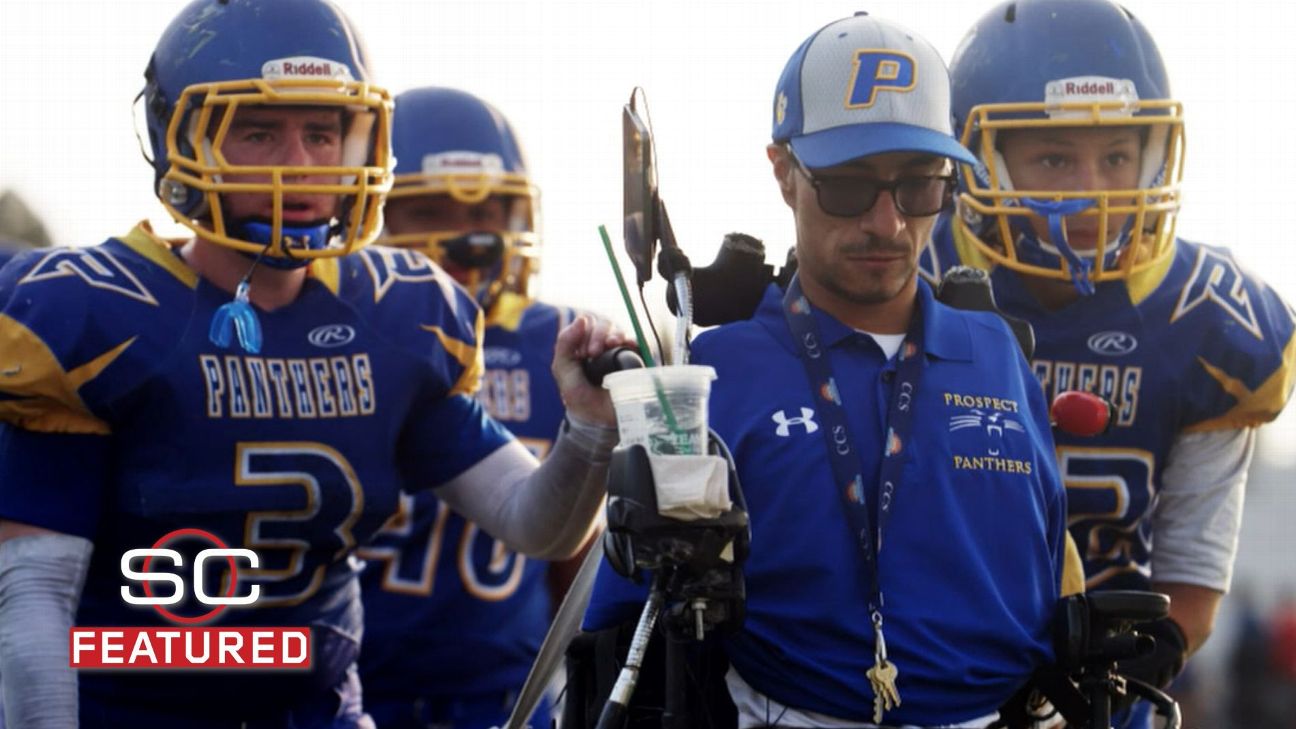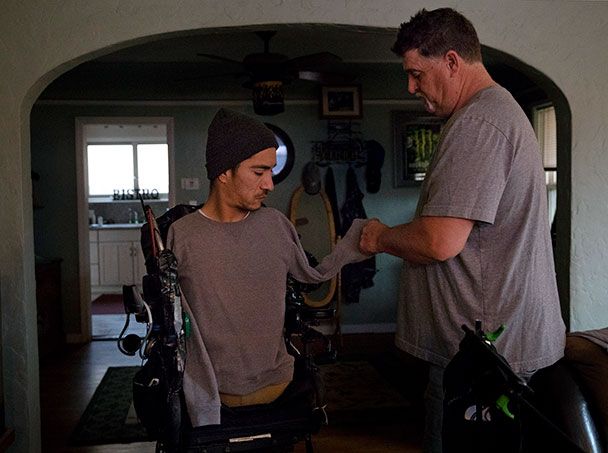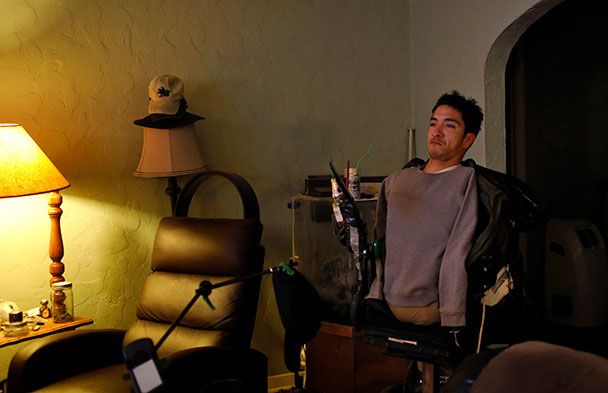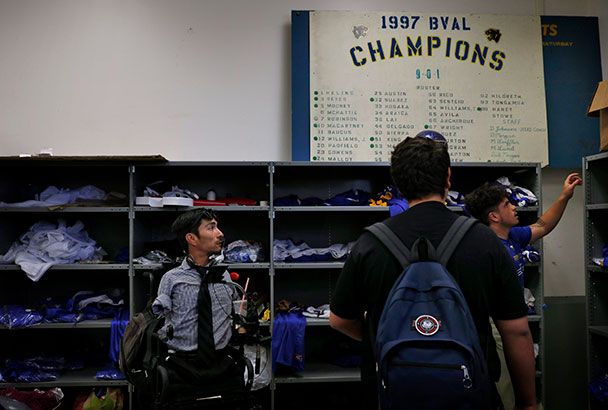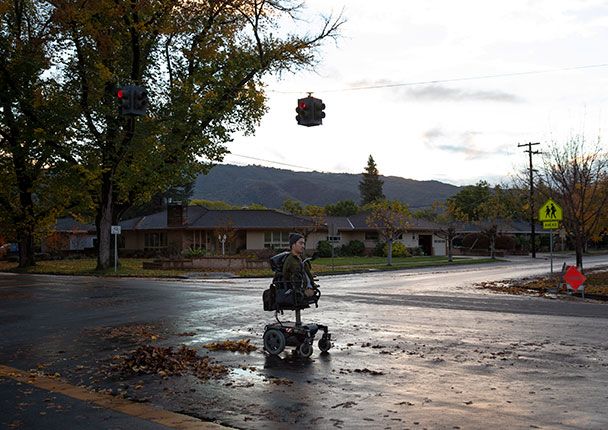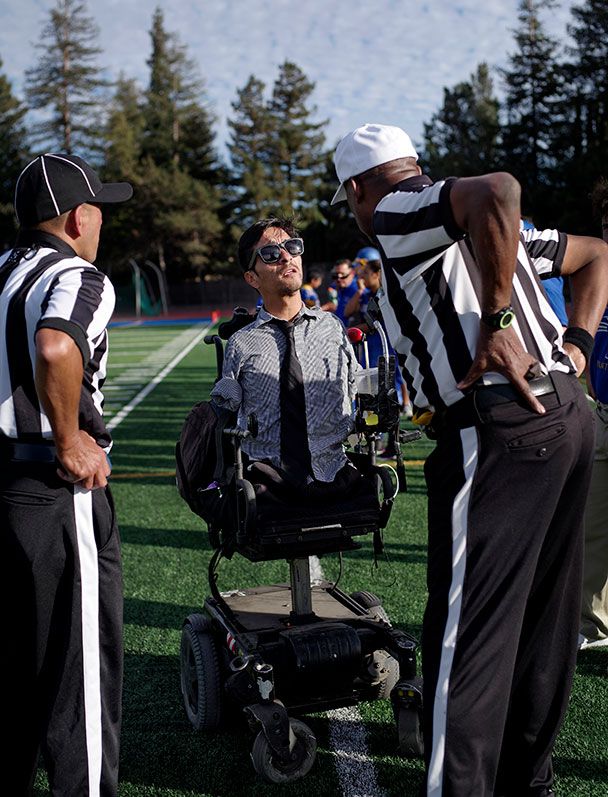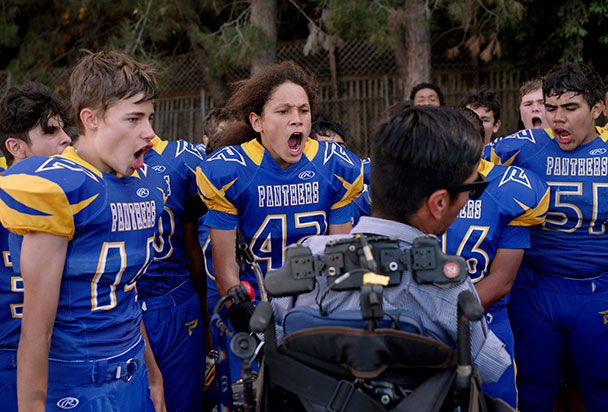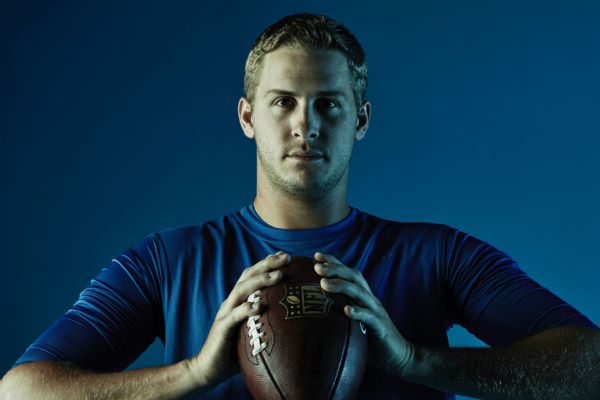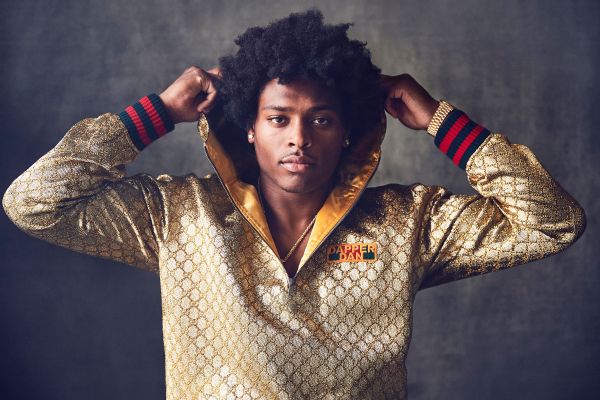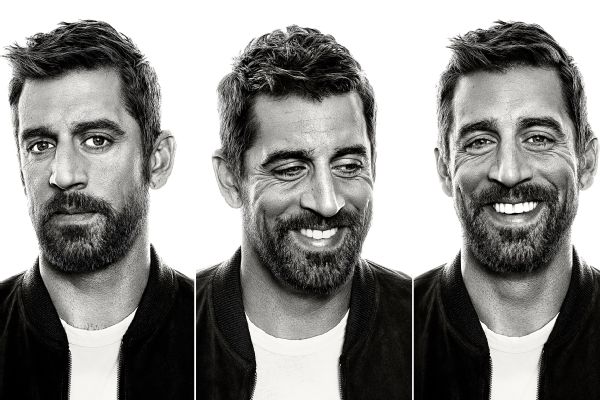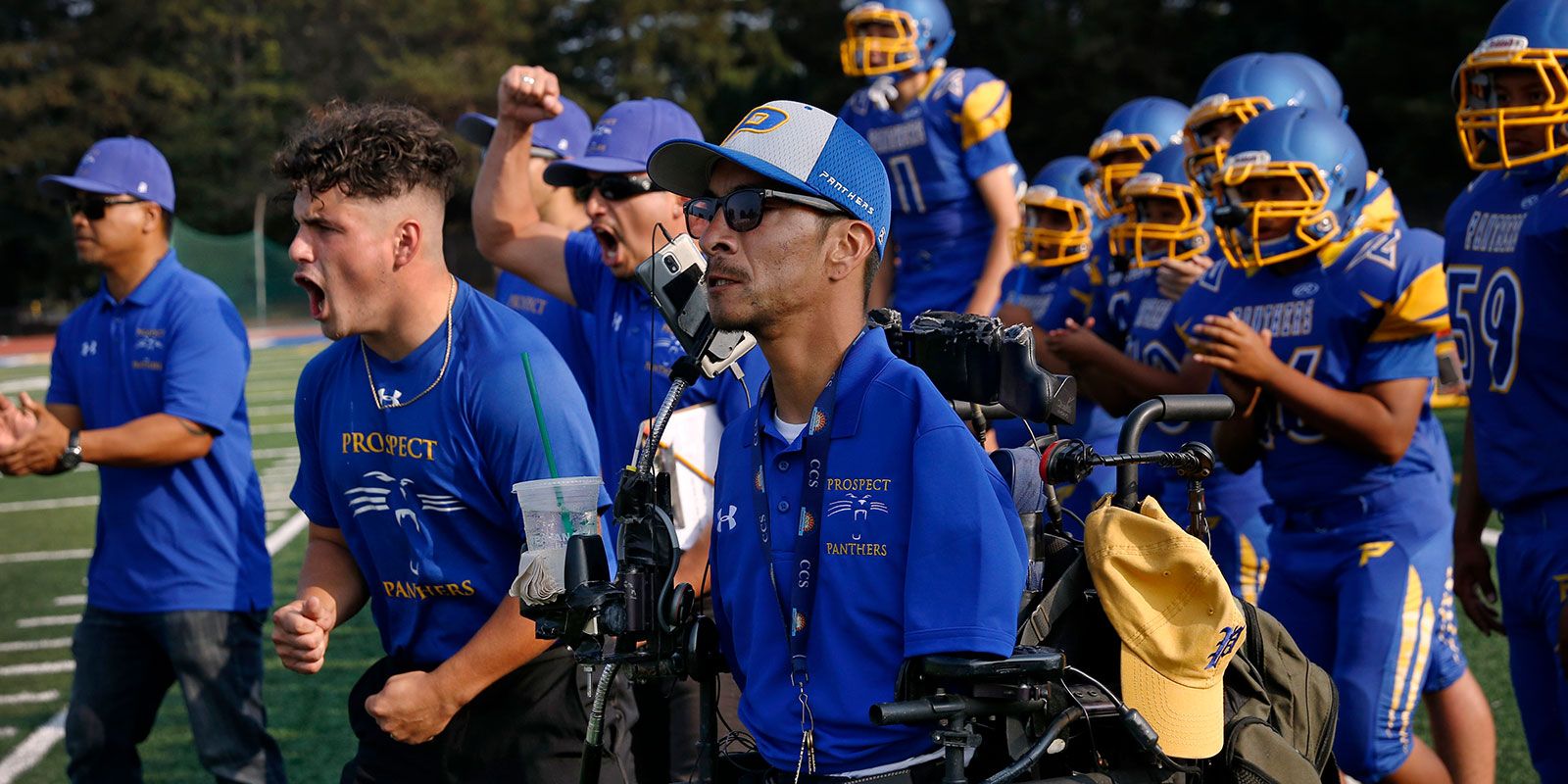
Who says I can't
How could someone born without arms or legs, who's never held a football, teach high school players how to throw, tackle or block? Rob Mendez is doing it as head coach of a California JV team.
IT'S THE BIGGEST weekend of the year in Gilroy, California, with more than 100,000 people visiting for the annual garlic festival. But on this late July night, 30-year-old high school football coach Rob Mendez has a taste for sushi. A young boy holds open the door as Mendez approaches his favorite spot. The coach nods and says "thank you." Earlier in the day, Mendez flew home from Las Vegas, a 48-hour escape before the insanity of the season begins. The lift mechanism on his wheelchair broke on the trip. And his roommate is resting back at home, exhausted from a pair of Vegas nights. But Mendez won't give up that easily. He's meeting me at the bar. He rolls in wearing a plain white T-shirt and faded red San Francisco 49ers hat. Most everyone recognizes him and says hello. He's like Norm from "Cheers." Without his wheelchair working properly, he can't raise its height to sit next to me at the bar. I suggest we move to a lower table and make things easier. He scoffs. "Screw that," he says. "I'm sitting right there at the bar next to you. Can you lift me out of my chair?" I panic. How do you move a fully grown adult with no arms and legs? Where do I put my hands? What if I drop him? Mendez gives me directions. I unbuckle the belt around his waist and weave it through the slits torn on the sides of his shirt. I lean over, wrap my hands around him and lift him out of his chair. "Put me on your shoulder," he says. He is 50 pounds of head, neck, torso and waist. It feels as if everyone is staring. I put Mendez on my shoulder, turn and then set him in the chair next to me. I stuff a pad between him and the chair back -- paranoid he could fall. He insists he's fine, and we order beers. His comes with a straw. There's a lot on his mind. The season begins in a month. Practice starts in a few days. It's only junior varsity. And few at Prospect High School, some 40 miles up the road in Saratoga, can remember the last time its JV won much of anything. But Mendez doesn't care about that. This is the opportunity he has waited 12 years for, the one he long felt he deserved but worried would never come. Mendez was born with tetra-amelia syndrome, a rare congenital disorder that prevents the formation of limbs during embryonic development. He has lived his entire life without arms and legs. He is mobile thanks to the chair he controls with his head and neck. It has given him a life otherwise inaccessible. "Thank you," he says to me after his first sip. "Maybe it's ego, but when somebody tells me I can't do something, or tries to separate me ... I just want to prove them wrong." Born without arms or legs, Rob Mendez was never able to play football, but that didn't stop him from pursuing his passion for the game as a coach.ESPN ROB MENDEZ IS not only the most unique high school football coach in America, he's one of the most unique humans in the world. The biography of Nick Vujicic, a 36-year-old motivational speaker from Australia who also has tetra-amelia, says there are just seven known people living in the world today with the syndrome. Mendez doesn't buy it. "There's no way," he says. "I can guarantee you there is someone with no arms and legs living in the mountains somewhere with a whole different story who isn't as active as we are. I agree it's a small percentage. A very small percentage. But seven? No way." Even if it were true, Mendez wouldn't look at things that way. He has spent his life fighting statistics, proving doctors and doubters wrong. He despises the word "special." The more we talk that night the more one word keeps popping up: How. How does he eat? How does he sleep? How does he go to the bathroom? How does he coach football? And how does he deal with such a challenging life? The day-to-day blanks are easy for him to fill in. The last question is far more complicated. There's the answer he feels as if he should deliver. And there's the reality of what he feels, but rarely reveals. We'll get to that. For now, I start with a topic far simpler: football. How did someone who has never thrown a ball, caught a pass or tackled anyone become a head coach? Mendez says it started with the Madden video game. His older sister, Jackie, pushed her brother to try new things and one day tucked a PlayStation controller under his chin. He learned to press the buttons with his chin and collarbone. Unlike fighting or fantasy games where he constantly had to engage, football gave him breaks. Pick a play, execute for a few seconds, take a break, pick another play and repeat. He couldn't get enough. In high school, his friends organized a 32-team Madden tournament. He finished second. "It sounds so ridiculous, but it's true," he says. "That's how humans are -- they adapt. I couldn't tell you what it felt like to catch a ball in the flat, but I knew what it was and why it worked." When his friends went out for football his freshman year of high school, Rob became the team manager. He absorbed everything he could. He drew up game plans on Madden and took them to practice. By his senior year, he worked his way up to quarterbacks coach. And he knew what he wanted to do for the rest of his life. His parents connected him with Vujicic, who Mendez said told him he could make $25,000 per night as a motivational speaker. Mendez didn't care. "We are two very different people. That's not me," Mendez says. "I just wanted to coach football." For the next 12 years, he worked as an assistant coach at five high schools, waiting for someone to believe in him as a head coach. That man was Mike Cable. Last April, the varsity coach at Prospect was looking for someone to help change the culture of the Prospect program when he came across Mendez's résumé. He put the name into Google. His jaw dropped. "I'm not going to lie. I was a little nervous about it," Cable says. "I kept thinking, 'How can this guy possibly coach?'" The interview began with Mendez asking Cable for a fist bump on the shoulder. Cable obliged. The two coaches connected. After a few minutes of conversation, Cable believed he had his man. And Mendez had the title he had achingly sought: head coach. For the past six years, Mike McAvoy has been Rob Mendez's caretaker, roommate and friend, each morning helping him with everything from taking a bath and brushing his teeth to getting dressed and eating breakfast. Preston Gannaway for ESPN A FEW MINUTES after our first beer, a bartender brings Mendez a plate of California rolls. They sit in front of us, untouched, for nearly 10 minutes. "Hey," he says, "Would you mind giving me a hand and putting one of those in my mouth?" I'd completely forgotten that Mendez can't feed himself. After a few minutes of conversation, he seemed like any other football coach having a beer on a Friday night. It's a testament to his ability to be comfortable in any surrounding and put strangers at ease. I pick up a fork, stab it into the roll, drag it through a puddle of soy sauce and put it in his mouth. He says thank you. It seems like no big deal. But later he acknowledges he hated having to ask for help. I mention that it seems as if anything that reminds him of his physical challenges bugs him. "Bugs the s--- out of me," he says. We end up talking for nearly three hours. As the clock approaches 11 p.m., he looks at his empty glass and asks for another drink. One of the bartenders reminds him he's not supposed to have more than two drinks. Because he weighs 50 pounds, alcohol affects him faster than people who weigh much more. Mendez orders a water. A few minutes later, he asks if I can follow him home. I assume Mendez will pilot his wheelchair on the sidewalk and I'll drive alongside for the five dimly lit blocks back to his house. But he hates the sidewalk. So I follow him in the bike lane, hazards on. Three blocks in, a blue pickup driving in the other direction recognizes the wheelchair. "Rob? Is that you?" the driver asks. "Where you going, man?" "Home," he answers. The driver makes a U-turn, pulls in front of Mendez and flips on his hazards. It's now a full-on escort -- a motorized wheelchair flanked by two cars with their hazards flashing. We make it to his home. There, he drives his chair into the living room, where his roommate and caretaker, Mike McAvoy, waits on the couch. "About damn time," McAvoy says with a grin. "Oh whatever," Mendez answers. "You know how it is." IT WASN'T UNTIL an ultrasound in the eighth month of her pregnancy that Rob's mother, Josie, found out her son was not growing limbs. At that point, she says, abortion wasn't an option. Doctors prepared her and her husband for the worst. In most cases of tetra-amelia, death occurs before birth. Some newborns survive only a few hours or days. Those who do survive often end up with significant intellectual disabilities. A few days before Rob was born, doctors walked his father, Robert Mendez Sr., through the hospital's neonatal intensive care unit. They wanted Bob to see other babies born with disabilities. But other than the tetra-amelia disorder, his son Rob was born a healthy baby boy. Afterward, Bob says doctors and nurses would walk by and stare. "They would whisper," he says. "It wasn't very polite or sensitive. But at 24, I didn't really know what to do or say at the time." Nor did he and Josie have any idea how to take care of this baby. It wasn't like there was a store to buy clothes or toys for children with no arms and legs. Initially, Josie struggled. She says she couldn't look at her son for the first couple of weeks. Later, she would cover Rob in blankets when they went in public. Rob's father saw potential in the happy, spunky baby, but also wrestled with his own emotions, admitting he often asked God "why?" Bob eventually turned to alcohol. Not until he nearly received a DUI driving Rob's handicapped accessible van did he realize the path he was on. "I was drinking to forget. And to just kill the pain," he says. "It didn't take long for me to figure out that alcohol is not the answer." Rob's parents tried to integrate him as early as they could, putting him in preschool at 18 months. "He was still in diapers," Bob says. On Rob's first day of kindergarten, they watched nervously behind a glass window as other 4- and 5-year-olds approached their son eager to learn about something most of them couldn't comprehend. For Rob, the message from his father was simple: Embrace your differences. "There was one word my dad never liked -- special," Mendez says. "Special is bulls---. We are all special. The other kids are special, too. What the hell does that even mean? My dad would tell me, 'You're not special, Rob. You're different. And different is not bad. Embrace it. Push the limits. And anyone who has a problem with that, prove them wrong.'" With the help of adaptive technology, he went skiing. And swimming. He learned how to draw and write using his mouth. He towed his friends around the neighborhood on their skateboards. His friends stuffed pillows in his shirt and attached a board to the front of his chair so he could play goalie in street hockey tournaments. When his friends played basketball, Rob was the referee. One thing the boy clearly didn't lack: confidence. If Rob sensed someone staring, he'd roll up and introduce himself. Still does. "I think every parent worries about their kids when they leave this earth," Bob says. "But even before he could talk, I said, 'Somewhere, somebody is going to open a door for this kid and he's going to shine.'" Mendez taught himself the game of football by playing Madden on a PlayStation, using his chin and collarbone to push the buttons. Preston Gannaway for ESPN MENDEZ'S WHEELCHAIR NEVER sits still, but the way it pinballs back and forth between the hashmarks on the Prospect practice field says the coach is not happy. It's the second day of the team's sleep-at-school preseason camp, and the coach is trying to install one of his favorite plays: the 37 stretch. His team is a mix of freshmen and sophomores, some with a bit of experience, most with little to none. The school sits on the western edge of Silicon Valley, just 5 miles from Apple's campus. Its classrooms are a melting pot. Minorities make up 73 percent of the student body. And 26 percent of the school's students are economically disadvantaged. When the players met their new coach, the whispers began. How could someone who had never held a football teach a freshman how to throw, tackle or block? One player quit because of Mendez. But those who stayed learned about their new coach. He demanded respect, eye contact and accountability. He talked about building a family. Encouraged the group to play for their teammates. And ended each practice with the same message: I love you guys. On this day, one of his freshman quarterbacks struggles to grasp the footwork on the 37 stretch. Mendez tries to explain, but the kid doesn't get it. Three other players start chitchatting between reps. Mendez loses it. "Get over here!" he yells. "Let's go!" The team jogs over and surrounds him. An assistant coach holds a whiteboard a few inches in front of Mendez. The quarterback removes the cap from a blue dry erase pen and puts it in Mendez's mouth. With the pen, Mendez draws the X's and O's of what the play is supposed to look like and why. "It's 37 stretch, right? We're going to fake it this way and then waggle out," he says. "But we really have to sell that we are going that way. They have to buy the fake. Otherwise it won't work. Make sense?" "Yes, Coach," the quarterback says. "I got it. I know what you're saying. I'm sorry." "You don't need to apologize," Mendez says. "Just focus -- you got this." The players jog back to their positions. They run the play again. This time it's flawless. "There you go!" Mendez screams. "That's what I'm talking about!" Mendez struggles to deal with back and neck pain from spending all day in his chair. Preston Gannaway for ESPN IN HIS 30 years, Mendez can't recall a single dream in which he has had arms or legs. It's an image his brain can't compute. There have been opportunities over the years to pursue prosthetic limbs, but he has turned them all down. He says he would consider prosthetics only if he ever became a father. As much as he doesn't want this syndrome to define him, at the same time there's a part of him that loves the fact that it sort of does. "I like the way I am, really," he says. "It brings out the best in people. I'm in Las Vegas and there's some guy stumbling drunk, looks like he was just in a fight. He sees me, and he stands up straight and pulls himself together so he can open the door for me. Things like that happen all the time. It gives me hope for the world." But those experiences come at great cost. Most days Mendez has chronic neck, back and shoulder pain. "I use my neck like my arm," Mendez says. "And the muscles in your neck are not supposed to be used that often. At the end of every day, I'm sore." Mendez operates his cellphone, attached to a stand on his wheelchair, with his nose and lips. He draws and writes with his mouth. In his chair, he is constantly shifting, twisting and adjusting his posture. On warmer days, he can get bed sores from sitting in the same position too long. He has scoliosis, which makes his spine look far more like an "S" than the "I." And because of Rob's lack of limbs, his father says he retains 30 percent more heat than someone who has arms and legs. When he's away from home, he's careful about what he eats and drinks, often keeping it to no more than an iced coffee. Otherwise there's the potential he'll need to use the bathroom without McAvoy there to help him. He hates talking about any of this. "Complaining is my No. 1 poison," he says. "So I try to stay positive. You hear stories about people with cancer, fighting for their lives. I'm fighting to have something to drink. To feel comfortable. So I try not to complain. It doesn't lead to a good place. It just makes me mad." McAvoy has been Mendez's caretaker for the past six years. Every morning, he helps with just about everything. Going to the bathroom. Taking a bath. Brushing teeth. Combing hair. Getting dressed. Shaving. Eating breakfast. And buckling Rob into his chair. Once buckled, Mendez says he feels unstoppable. "You know how Ironman gets in his suit and he just starts flying everywhere? That's how I feel in my chair," he says. "It gives me this sense of independence." Mendez acknowledges that his presence has had a positive impact on people. "But I don't think about this the same way everybody else does," he says. "It's just me." Preston Gannaway for ESPN THE DAY AFTER teaching his quarterback the 37 stretch, Mendez sits under the lights at the Prospect 50-yard line, exhausted. It's almost midnight. He wanted to leave by 9 p.m., but one conversation led to another. Now the entire Prospect program circles around Mendez at midfield. He tells the story of his father putting him on the stairs when he was 9 years old, demanding that he climb to the top. Rob would set his chin on the ledge of the next step and use that to lift his entire body. It took him more than a half hour - sometimes two steps up, one step down -- but he did it. "You have to believe," he says. "Think about it. What do you want out of this year? What do you want people to say about this team? How are you going to get there?" After his speech, Mendez asks for a ride home. The battery on his wheelchair is dead, and he wants to charge it at school overnight. I lift him out of his chair and carry him to my car, buckling him into the passenger's seat. As we head back to Gilroy, I ask Mendez if he's aware of the impact he has already had on Prospect players and coaches like assistant Todd Livingston. Livingston told me Mendez's presence is living proof of what humans are capable of. Mendez shakes his head. "I know that's there," he says. "But I don't think about this the same way everybody else does. It's just me. I don't focus on it." He acknowledges that the attention is often uncomfortable. He's had people who hear his story and then approach him in tears. "How in the world am I supposed to handle that?" he says. "I just try to shut it down as quickly as possible." I mention that one of the themes I'm thinking about for his story is this idea of a beautiful mind. He immediately snaps. "No, no, no," he says. "I'm not going to let that happen. I'm not beautiful at all. I don't want to be put on a pedestal. I just want to be Coach Rob. Coach Mendez. I love that. I don't sign up for being inspirational Rob." But it isn't that simple. The more successful Mendez is at proving he's just like everyone else, the more people put him on that pedestal, peg him as an inspiration and treat him, well, different from everyone else. I think back to something his pediatric physical therapist told me. "When someone is born this way, this is their world," says Dr. Benjamin Mandac, Mendez's pediatric physical therapist who now is the head of that department at Kaiser Permanente in the Bay Area. "They don't have the grief of losing a limb because they never had it. It's society that imposes that grief. We're the ones who feel sorry for them and say, 'Oh you poor thing.' They just want to move, explore and live. Rob is no different." The green mile marker signs fly past on Highway 101. Mendez is hungry. Tired. He needs to use the bathroom. And he doesn't like the idea I have for framing his story. He says if he had arms and legs he has no idea how his life would be different. I ask whether that thought bothers him. And just like that, the man who so often projects like everything is fine rips off his facade. "Yes!" he says. "Let's get to the bottom of it. I'm lazy. I haven't graduated college yet. I should have a wife by now. I know I'm good for the kids. I love the feeling when I lift kids up. But I'm 30 years old and a JV high school football coach. It's an accomplishment to the public because I have no arms and legs, but the reality is I'm not accomplished. And yeah, of course that's frustrating." I tell him that's the most honest he's been in our time together. But I don't know what else to say. For the last few minutes of our ride, we both keep quiet. When we pull into the driveway, McAvoy comes out and carries Mendez into the house. As they head inside, Mendez looks back at me over McAvoy's shoulder. "I'm sorry," he says. "I guess you saw a little bit of the other side tonight. This life ... it just isn't always easy." Mendez makes a trip to a nearby shopping center for coffee. Preston Gannaway for ESPN LESS THAN TWO weeks before his son's first game as a head coach, Bob Mendez prepares to drive Rob home after Sunday family dinner. He briefly leaves Rob in the garage to run inside. Rob leans forward in his chair to reach his cell phone. It's a move he makes countless times a day. But this time, he has no idea the belt around his waist isn't buckled. He tumbles forward. There is nothing to break his fall. He turns his face to the right, pulls his head back and prays. The left side of his face slams into the concrete floor of the garage. Bob hears the sound from a few feet away. "It was just ... it was horrible," Bob says. "Like a pancake hitting the ground. A 10-story building hitting the ground. I swear I buckled him in. I swear. I turned around, took two to three steps and then I heard it." It isn't the first time Rob has fallen out of his chair. It happened at the end of his senior prom, when he tipped over the wheelchair ramp as he and his classmates were leaving. His father has long wished that Rob would wear an upper belt as well as the one that wraps around his waist. But Rob refuses because the upper belt limits his ability to access his phone and draw plays. "Anything in the world that is worth doing, he's done it with his mind," Bob says. "And you're risking it all by not wearing an upper belt." This is one of the worst falls. Blood runs everywhere. Bob rushes his son to the hospital. Rob has fractured cheek and orbital bones and has the effects of a concussion. Doctors recommend surgery. They tell Rob he can't coach for at least four weeks. He doesn't listen. That night he can't sleep. He can barely open his mouth. The next day he spends almost entirely in bed, unable to open his eyes. By Tuesday afternoon, he's back at Prospect for practice, apologizing to his players for Monday's absence. When his players ask what happened, he tells them he got into a fight with the pavement. "I'm pretty good at dealing with pain, and I didn't want to stay home feeling sorry for myself," he says. "If I can go out there and power through four or five hours, then I'm OK." Says McAvoy: "That's just him. He can be stubborn. He doesn't eat right. He doesn't listen to the doctors like he should. But he's always there for the kids. He says they need him, but you know what? I think he needs them just as much." Physically, Mendez is unlike any other high school football coach in the U.S. Mentally and emotionally, he's no different. And that includes getting on the officials when something doesn't go his way. Preston Gannaway for ESPN THREE MONTHS AFTER we first met, Mendez and I are in another bar, this time in downtown Campbell. It's the Friday night before Halloween. The World Series is on television. Mendez picks a spot at the bar next to two women. In less than a minute he introduces himself, then me and strikes up a conversation. In the morning, he will coach the biggest game of his young career. Some might suggest he should be home, resting. But here, he's in his element. Holding court, triggering laughs and helping people realize for a few minutes that a man in a wheelchair without arms and legs is just like anyone else. "I'm not afraid to be myself," he tells me later. "I wish more people were like that. If I'm sitting there and don't smile or say hello, I just feel like that's rude." The season has been a greater success than Mendez could have imagined. His greatest fear was failure. But after losing the season opener to Santa Clara, his Panthers won seven games in a row. Along the way, Cable invited Mendez's two best players to move to varsity. They chose to stay with him. In a little more than 12 hours, Prospect will play for the league JV championship. The school they will face, Ann Sobrato, fired Mendez as an assistant three years earlier. "Said they wanted to move on without me," Mendez says. "In a text message." Sobrato is located across the street from his parents' home in Morgan Hill. On convenience alone, it would have been the perfect place for him to coach forever. Now comes the opportunity to prove the school made a mistake. "The Super Bowl of JV football," he says. Andre Jackson gets instructions from Mendez during the team's first game of the season. Preston Gannaway for ESPN WITH LESS THAN two minutes remaining in the game, Prospect trails 3-0 facing a fourth-and-14 just inside Sobrato territory. Mendez calls his last timeout. Neither team has moved the ball all day, with the game's only points coming on a 35-yard Sobrato field goal three minutes earlier. Prospect's lone highlight came on defense when, just before halftime, the Panthers stonewalled Sobrato on four straight plays from the goal line to keep the game scoreless. The battery on Mendez's wheelchair is dead, so two Panthers push him onto the field. He tells his offense he believes in them. And he calls the exact same play he did on the previous down, flipping it to the other side of the field: Rex nine left, 180 smash. If all goes well, a receiver should be open about 15 yards downfield right in front of the Prospect sideline. As the quarterback rolls out, the play unfolds perfectly. The receiver is open. Mendez looks up as the quarterback's pass sails overhead. His head drops. The throw is too long, and the ball harmlessly caroms out of bounds. Tears begin to fall. Mendez rolls over to his dejected quarterback. "We live and die with each other," he says. "We live and die." Mendez leans forward in his chair. His torso pushes against his belt. He asks his quarterback for a hug. The 14-year-old wraps his arms tightly around Mendez's back. "I appreciate you," Mendez says. "I love you, bro. I'm proud of you. I'm proud of everyone. It's all good." When the final buzzer sounds, the players and coaches line up at the 50 to shake hands. Mendez gets a fist-to-shoulder bump from every Sobrato player. Luis Lopez, the JV coach who worked with Mendez at the school, hugs Mendez. "Great job, Coach. I love you, man," Lopez says. "I'm so proud of you. Good s--- you've done with those kids. You guys fought your butts off. Keep your heads up. Next year you'll be back in it, believe me." Mendez hopes to someday have the opportunity to coach varsity. For now, he's still glowing from the impact his team had on him in his first JV season. "Those kids," he says, "gave me the feeling that I can do anything." Preston Gannaway for ESPN ONE WEEK LATER, Prospect finishes its season 8-2 with a 19-13 victory over Yerba Buena. On this night, on the same field where this journey began, Mendez gathers his team one last time. It isn't about what the players did right or wrong or what they need to clean up before the next game. Instead, Mendez repeats two words over and over and over: thank you. He knows what he has given his team. He can see how they've grown as players and people. He has heard it from their parents and teachers. But he wonders whether the players have any idea what they've given him. "In life, I feel like I'm always being helped," he says. "They gave me the feeling of being the helper. They gave me a feeling of importance. And that's special because sometimes in this world, on a day-to-day basis, I wish I could do more. And those kids gave me the feeling that I can do anything." In the months that follow, Mendez unplugs from football. He reads, draws and spends extra time with family and friends. A handful of schools reach out about head-coaching jobs, but he says he's almost certain he will return to Prospect to lead its JV squad again next season. "I don't think I could do that to those kids," he says. "We have unfinished business." The time away from football has given Mendez a chance to reflect on his first season as a head coach. It confirmed how much he despises losing. "The Sobrato loss still bothers me," he says in February. "I think it always will." It showed him how much energy he draws from the kids. But most importantly, it's given him an understanding of his journey in this world, a path untethered to anything anyone on the outside might say, think or believe. "This was confirmation that you know what, I'm doing OK," he says. "I'm not the perfect guy. I make mistakes. I might take two steps forward and then one step back. But I learned that I can be a leader. I can work with people. I can adjust to anything that's thrown my way. And with that, in this world, I know I'm going to be all right." ESPN producer Kristen Lappas directed the SC Featured documentary, available on ESPN+. ESPN senior writer Wayne Drehs contributed to the documentary as a writer and reporter.
